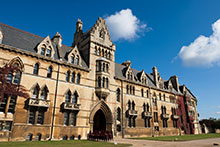Going to uni – decisions begin with A level choices

In an era where competition for university places and employment for graduates is intense, students are under even greater pressure to make the right choices. That starts way back in Year 8/9 with GCSE choices, but at least the core subjects such as maths and English are compulsory, so you can’t go too far off the right track. It is worth bearing in mind that the minimum entry requirement for many university courses is a C in maths GCSE though...
Choosing A levels – what to consider
By the time you are in Year 11 and choosing A levels and colleges you really need to start thinking hard about your future career path. This is not easy as many 16-year olds just have no idea of what they want to do. So what strategies can you use to start narrowing down your choices?
What are you good at?
 Start with the subjects that you were best at and in which you are expected to do really well. Sometimes this provides an obvious path:
Start with the subjects that you were best at and in which you are expected to do really well. Sometimes this provides an obvious path:
- If you love science and are on track to get an A in maths and the separate sciences, choosing A levels that follow will not give you the choice of a wide range of science and biomedical science courses at uni – including vocational courses such as medicine, vet medicine and dentistry.
- Love languages? English and a couple of modern languages may be the perfect choice.
What do you enjoy most?
If your GCSE grades are expected to be average to good across the board, look at what you really love doing:
- You may love English and writing, but have a keen interest in biological sciences. Combining English, media studies and biology could be the passport to a journalism course and a career as a science writer, even though it may seem like an odd combination at first glance.
- If art is your thing, combining Art A level with a related subject such as Textiles and Business Studies would mean greater choices at university and wider employment options.
What A levels do the top universities prefer?
 Although you should not choose your A levels purely as a means to an end, it is a good idea to check out which subjects don’t find favour with universities in the Russell Group. Most of them and other universities don’t accept General Studies A level as one of your core subjects, and some tend to overlook students who combine A levels with BTECs.
Although you should not choose your A levels purely as a means to an end, it is a good idea to check out which subjects don’t find favour with universities in the Russell Group. Most of them and other universities don’t accept General Studies A level as one of your core subjects, and some tend to overlook students who combine A levels with BTECs.
If you have chosen two core subjects but are undecided on a third, maths, English, business studies or a modern language are all very well regarded.
Avoid choosing something you hate – two years is a long time to focus on a subject that you find intensely boring.
Do you need A levels for your chosen career?
If you have decided on a definite career path, this is usually because you enjoy the related subjects so your top subjects will be easy to pin down. However, do your research if you want to pursue a career in which the choices are less obvious. If you want to do engineering or computer science, many universities will look more favourably on you if you have a good maths A level, as maths is such a core part of those courses.
A level choices to maximise your employability
If you are don’t know what you want to do at uni and beyond, it makes sense to choose subjects that will give you as many career options as possible. Business studies, a language, English, economics, maths, history and geography are all good core subjects that are acceptable to universities and the skills you learn can be applied in a range of different jobs and careers.
Get advice early
Don’t think you have to make these choices alone. Many students find it difficult and your school or college will have careers advisors with up-to-date knowledge that you can make use of – if you ask. If you run into a brick wall and your school doesn’t know much about the courses you are thinking of, do your research on university websites and call them direct. Admissions offices are usually very helpful and can provide information about specific course requirements.

